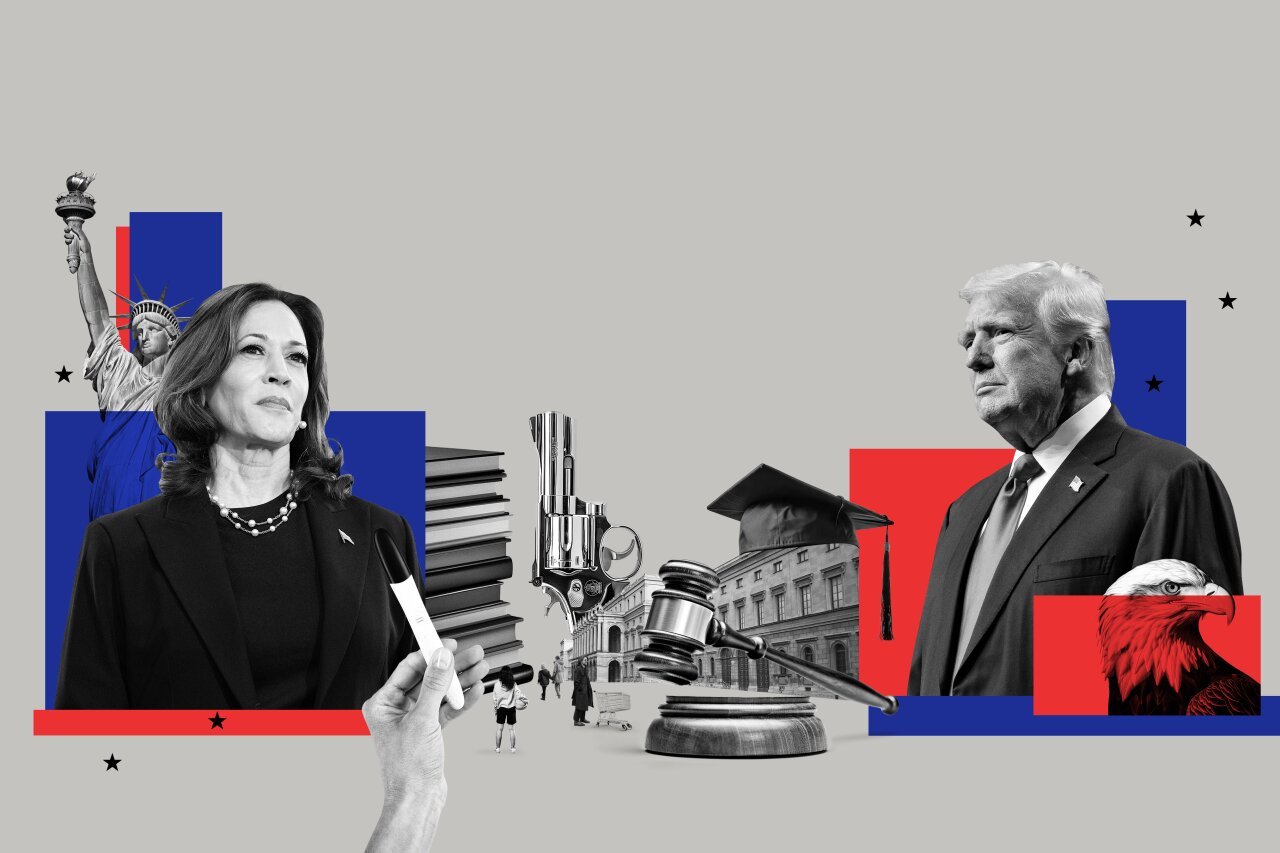How do Trump and Harris differ on inflation? Foreign policy? Education? Our decision guides explain where the candidates stand on the most important policy issues.
The 2024 presidential election presents Americans with a monumental decision between two candidates: former President Donald Trump and Vice President Kamala Harris.
The pair is putting forward starkly different visions of America, with Trump’s revived goal of making America great again and Harris’ rallying message of unity.
Trump’s campaign focus is mostly on immigration and inflation, attempting to paint Harris with the same brush he was using on President Joe Biden before he dropped out of the election. Harris has centered her campaign around reproductive issues, including abortion access and preserving democracy, while trying to differentiate herself from Biden on certain topics, including the economy.
To learn more about how the candidates differ on major policy issues, explore the seven election decision guides below:
Foreign Policy
Harris is only beginning to reveal her foreign policy agenda. Yet analysts expect her to surround herself with expertise and – like President Joe Biden – seek to uphold alliances and American engagement.
For Trump, “there is no overarching ideology or even a trust in sort of a foreign policy tradition of the United States,” says Michael O’Hanlon, a senior fellow in Foreign Policy at the Brookings Institution.
Trump has sowed doubt about America’s commitment to NATO, promised to impose a 60% tariff on all Chinese imports, expressed pro-Russia leanings, and bragged that he could end the war in Ukraine in one day, all of which are at odds with Harris’ professed positions. Both candidates have emphasized their support for Israel in its war in Gaza.
Immigration and Border Policy
The Biden-Harris administration has sought to project strength on immigration. Harris has noted that as the attorney general of California – also a border state – she “went after the transnational gangs, the drug cartels, and human traffickers,” and her campaign manager signaled to CBS News that she would keep in place a polarizing executive order that restricted asylum for migrants who illegally cross the southern border during times of high volume.
As president, Trump pushed through many restrictive immigration policies such as a travel ban aimed at several Muslim-majority countries. Trump has vowed to restore at least some of his previous policies, “seal the border” and launch a massive deportation effort if reelected in November.
Earlier this year, lawmakers attempted to pass a bipartisan bill that included increased funding and resources for border officials in addition to some relatively hard-line measures. The legislation was blocked by Republicans largely due to opposition from Trump. Harris, meanwhile, supported the bipartisan legislation at the time and noted Trump’s efforts to kill it in her remarks at an August rally in Arizona.
The Economy and Tax Policy
Former President Donald Trump has his economic record to stand on from his time in office and it is one that was marked by a huge tax cut, deregulation of industry, and trade wars with economic competitors – most notably China.
As the GOP nominee, Trump is doubling down on his first-time highlights, promising more of the same. He has said he favors lowering the corporate income tax rate to 15% from 21%, advocated for a much broader, across-the-board 10% tariff on imported goods, and promised to reverse a lot of the green energy subsidies and mandates that the Biden administration has championed. He has also promised to take care of inflation and lower interest rates, which the Fed controls, but has not said how he would do this.
Vice President Kamala Harris, now the presumptive Democratic standard-bearer, will be tied to the Biden economic agenda, but she has begun to offer some ideas of her own – primarily an emphasis on family-friendly topics such as paid leave and child care support. In general, she has shown support when she was in the Senate for more progressive economic policies and could well appoint some more liberal-leaning folks to the Fed when vacancies arise.
Abortion Policy
November will mark the first presidential election since Roe v. Wade was overturned in 2022, and the two candidates are running campaigns with widely divergent strategies on the issue.
Trump has mostly avoided definitive statements on his potential future policies while repeatedly taking credit for states’ efforts to limit access to abortion. In the past, he has been inconsistent on the subject, to put it lightly. In 1999, before his political career, Trump said that he was “very pro-choice.” More recently, he has described himself as the “most pro-life president” in U.S. history, though he has also stated that he would not sign a national abortion ban if it passed Congress.
Harris, on the other hand, has been unwavering in support of abortion rights. As a senator and presidential candidate in 2019, she put forward an extensive plan to protect abortion access in which states would be required to get preclearance from the Justice Department before changing abortion laws. She is also believed to be the first sitting U.S. vice president to ever visit an abortion clinic.
A Harris presidency could see “more risk-taking” on the subject of abortion than the current administration, says Mary Ziegler, an abortion law expert at UC Davis School of Law. Biden, a practicing Catholic, doesn’t always mention the word “abortion” when talking about Roe v. Wade and has sometimes been described as uneasy talking about the issue.
Education Policy
Harris advocates for injecting more funding in K-12, especially for increasing teacher pay and breaking down segregated school systems. She also supports universal preschool. On the higher education front, expect her to build on the Biden’s administration pursuit of student loan debt cancellation and boost funding for historically Black colleges and universities.
Meanwhile, Trump favors abolishing the Education Department altogether and has boasted close ties to the conservative policymakers behind Project 2025, the Heritage Foundation’s 900-page transition playbook for Trump, which includes proposals to expand private school choice programs, roll back Title IX protections for LGBTQ students and prosecute colleges that maintain affirmative action and DEI policies.
On the topic of school curriculums, Trump favors cutting federal funding for any school or program that includes “critical race theory, gender ideology, or other inappropriate racial, sexual, or political content onto our children,” while Harris opposes book bans – “we want to ban assault weapons, they want to ban books” has become a favorite rally cry for her.
Democracy
Notably, Trump stands by his actions regarding the Capitol riot on Jan. 6, 2021 – in which his supporters smashed through windows, doors, and lines of police to disrupt the certification of the election he lost – and has pledged to free supporters who have been charged and imprisoned for their involvement with the attack.
Beyond the instance of the riot at the Capitol, Trump has vowed to be a dictator on day one if reelected, has said he has “every right” to punish his political enemies, and called for the termination of parts of the Constitution. Yet he’s also portrayed himself as a defender of American values and Biden as the “destroyer” of democracy and accused the president of weaponizing the justice system against him. In the wake of his assassination attempt, he’s said he “took a bullet for democracy.”
With Harris now sitting atop the ticket, she appears to have decided strategically to get at the issue of democracy by focusing on freedom. Her campaign is especially concentrated on the future, and in pointing out rights she says Trump would take away if reelected.
The Supreme Court
The next president will wrestle with the consequences of a Supreme Court teetering on the edge of relevance, and will likely get to pick two new justices. As it stands, Justices Clarence Thomas, 75, and Samuel Alito, 73, are the oldest members of the court – as well as the most conservative of them. Most Supreme Court experts expect the next president to nominate their replacements.
Trump hand-picked three current justices – Neil Gorsuch, Brett Kavanaugh, and Amy Coney Barrett – all of whom are 55 or younger, meaning they’ll almost certainly be fixtures atop the dais for roughly two decades. And if Trump were to be elected again in 2024, experts predict he’d continue the path he set as president.
Before becoming vice president, Harris was a senator on the Judiciary Committee, where her prosecutorial dressdowns of the three judges nominated by then-President Donald Trump during their confirmation processes garnered her national recognition. Harris has not yet shared the type of experiences she’s looking for in a justice should a seat become open.
Related posts:
- Barack Obama to Headline Tuesday at the DNC, Where Michelle Obama Will Also Speak
- RFK Jr. Endorsing Trump? Why Dems Needn’t Sweat the End of His Campaign
- Fed’s actions spoke louder than words in inflation fight, research shows
- House speaker pushes funding bill that includes proof of citizenship mandate

















Leave a Reply